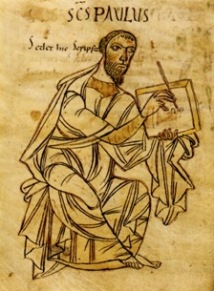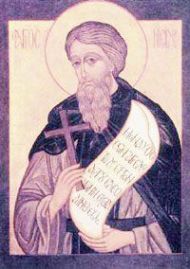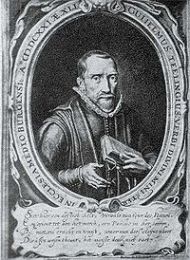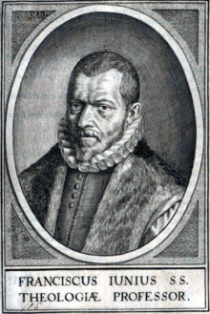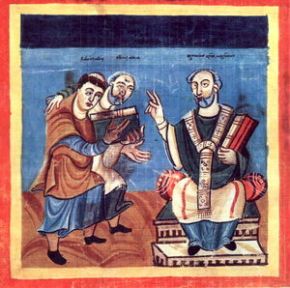
Gregory the Great (c. 540-604) was in the Augustinian tradition, but his Augustinianism was somewhat attenuated. He taught that through the sin of the first man all men became sinners and as such all are subject to condemnation. This sounds rather Augustinian, but Gregory did not carry these ideas through consistently. He regarded sin as a weakness or disease rather than as guilt, and taught that man had not lost the freedom but only the goodness of the will. At the same time he stressed the fact that without grace there can be no salvation nor any human merits. The work of redemption is begun by the grace of God. Prevenient grace causes man to will the good, and subsequent grace enables him to do it. The change in man is begun in baptism, which works faith and cancels the guilt of past sins. The will is renewed and the heart is filled with the love of God, and thus man is enabled to merit something with God.
Gregory thus retained the Augustinian doctrine of predestination only in a modified form. While he speaks of the irresistibility of grace, and of predestination as the secret counsel of God respecting the certain and definite number of the elect, this is after all only a predestination based on foreknowledge. God appoints a certain definite number unto salvation, since He knows that they will accept the Gospel. But no one can be certain of his own election or of that of anyone else.
Augustine (354-430) had occasionally spoken of a double predestination, and Isidore of Seville (c. 560-636) still wrote of it as being twofold. But many of the Augustinians in the 7th, 8th and 9th centuries lost sight of this double character of predestination, and interpreted it as Gregory had done. Then came Gottschalk of Orbais (c. 804-869), who found rest for his soul only in the Augustinian doctrine of election (as we Reformed Protestants still do today), and contended earnestly for a double predestination, that is, a predestination of the lost as well as of the saved. He was careful, however, to limit the divine efficiency to the redemptive line and the production of holiness, and to regard sin merely as the object of a permissive decree which nevertheless rendered it on foreknowledge, since this makes the divine decree dependent on the acts of man. Prescience merely accompanies predestination and attests to the justice thereof.
Gottschalk met a great deal of unwarranted opposition. His opponents did not understand him and lodged against him the familiar accusation that his teachings made God the author of sin. At the Synod of Mainz in 849, he was condemned as a heretic and disturber of the public peace, deposed, beaten, obliged to burn his confession of faith (posted below) and detained in a monastery at Hautvillers. A debate ensued, in which several influential theologians, such as Prudentius of Troyes, Ratramnus of Corbie, Remigius, and others, defended the doctrine of double predestination as Augustinian, while especially Rabanus and Hincmar of Rheims opposed it. The Church itself was split: The Council of Quiercy (853) stood behind the views of the opponents, the Council of Valence (855) stood behind the views of the defenders. The statement at the Council of Valence reads as follows:
“We confess a predestination of the elect to life, and a predestination of the wicked to death; but that, in the election of those who are saved, the mercy of God precedes good merit, and in the condemnation of those who will perish, evil merit precedes the righteous judgment of God. But that in predestination God has determined only those things which He Himself would do, either from gratuitous mercy or in righteous judgment… But that in the wicked He foreknew the wickedness because it comes from them; and does not predestinate it, because it does not come from Him.”
Below is Gottschalk’s confession which he presented in his defence at the Synod of Mainz in 849. I have put the sources he quoted in bold to show clearly where he was drawing from Augustine and other early church leaders (which the Reformers also did):
“I believe and confess that God, omnipotently and unchangeably, has graciously foreknown and predestined holy angels and elect men to eternal life, but that He like manner (pariter) has, by his most just judgment, predestined head of all the demons, with all his apostate angels and also with reprobate men, who are his members, on account of their foreknown particular future evil deeds, to merited eternal death: this the Lord Himself affirms in His Gospel: ‘The prince of this world is already judged’ (John 14:11).
Augustine, beautifully explaining these words to the people (Augustine on John, tract. 95), has spoken as follows: ‘That is, he has been irrevocably destined to the judgment of eternal fire.’ Likewise concerning the reprobate, the same is true: ‘Who then believeth not is already judged’ (John 3:18), that is (as the aforesaid author explains), (tract. xii), already is damned: ‘Not that judgment now is manifest, but that judgment is already wrought.’ Likewise explaining these words of John the Baptist: ‘man has received’ (John 3:32), he speaks in this wise (tract. xiv): ‘is a certain people prepared to wrath by God, damned with the Devil.’ ‘Those dead scorners, predestinated to eternal death.’ Again (tract. xlviii): Why did the Lord say to the Jews: (John 10:26), ‘Ye believe not because ye are not of my sheep’ (John 10:26), unless he saw that they were predestinated to everlasting destruction and not to life eternal by the price of his own blood. Also, explaining these words of the Lord (ibid): ‘My sheep hear my voice and I know them and they follow me and I give to them eternal life, and they shall never perish, and no one shall snatch them out of my hand: My Father who gave them to me is greater than all, and no one is able to snatch them out of my Father’s hand’ (John 10:27-29), and he says this: ‘What can the wolf do? What can the thief and robber do? They destroy none, except those predestined to destruction.’ Speaking in like manner concerning the two worlds (tract. lxxxvii) he says: ‘The whole world is the church, and the whole world hates the church; the world, therefore, hates the world, the hostile that which is reconciled, the damned that which is saved, the polluted that which is cleansed.’ Likewise (tract. cx) he says: ‘There is a world concerning which the Apostle says: ‘that we should not be condemned with this world’ (1 Cor 11:32). For that world that the Lord does not pray, for he certainly cannot ignore that for which it is predestinated. Likewise (tract cvii): ‘Judas the betrayer of Christ is called the son of perdition as the one predestinated to be the betrayer.’ Likewise in Enchiridion (cap. 100): ‘To their damnation whom he has justly predestinated to punishment.’ Likewise in the book On Manichaeus’ Perfection in Righteousness he says (cap. 13): ‘This good, which is required, there is not anyone who does it, not even one; but this refers to that class of men who have been predestinated to destruction: indeed, upon those the foreknowledge of God looks down and pronounces sentence.’ Likewise in the books de Civitate Dei (lib. xxii, c. 24): ‘Which is given to those who have been predestinated to death.’ Likewise blessed Gregory the Pope (Moral. lib. xxxiv, c.2): ‘Leviathan with all his members has been cut off for eternal torment.’ Likewise holy Fulgentius in the third book Concerning the Truth of Predestination and Grace (lib. iii, c. 5) says: ‘God has prepared punishment for those sinners (at least) who have been justly predestinated to the suffering of punishment.’ And blessed Fulgentius has composed one whole book for his friend Monimus concerning this tantamount question, that is: Concerning the Predestination of the Reprobate to Destruction, (lib. i).
Whence also holy Isidore says (Sentent. 2. cap. 6): ‘Predestination is double (gemina) whether of election to peace, or of reprobation to death.’ The same thing, therefore, (with others) I believe and confess, though whatever may happen, with those who are the elect of God and true Catholics, according as I am helped by divine inspiration, encouragement and provision. Amen.
False, indeed, is the witness, who in speaking of any aspect of those things, corrupts them either superficially or with respect to their essential sense.”
– Gottschalk of Orbais (c. 804-869), Confessio Brevior (Shorter Confession)
We see therefore that Gottschalk is an important Medieval witness of the fact that double predestination was not an invention of John Calvin in the 16th century. Indeed, Gottschalk turned to Augustine’s strong anti-Pelagian and ant-Semi-Pelagian views, which was a foreshadowing of the Neo-Augustinian renaissance which began before the Reformation and included a number of outstanding late Medieval theologians including Gregory of Rimini, from whom some of the Protestants also drew their doctrine of predestination.








